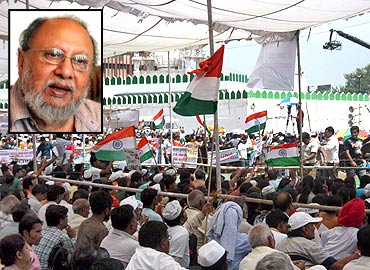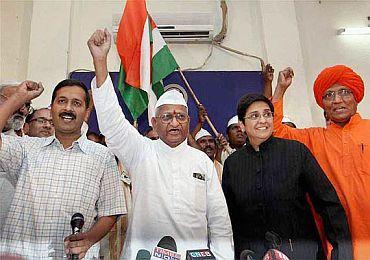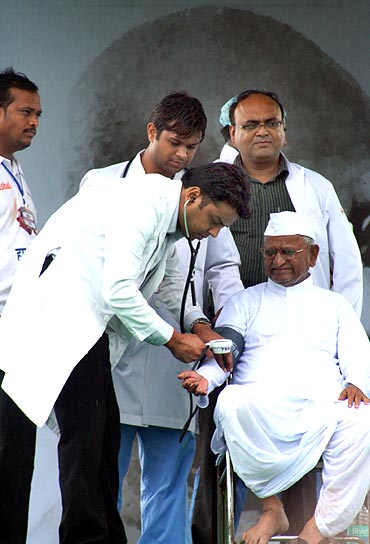Photographs: Sanjay Sawant/Rediff.com Prasanna D Zore in New Delhi
Social thinker and political commentator Ashis Nandy spoke with rediff.com's Prasanna D Zore on a range of topics surrounding one man -- social activist Anna Hazare.
Nandy believes that Hazare's anti-corruption crusade has struck a right chord with the masses. He says that Hazare is a simple man with the attitude of a village elder, and it is this simplicity that is drawing throngs of people towards his cause.
How do you see the situation building up in New Delhi after Anna Hazare's arrest on August 16?
They (the Congress) should have understood that Anna Hazare is no Mahatama Gandhi or Jayprakash Narayan. He is a much more modest man with much more modest talent. People's sympathy would be automatically with him. It is not that Hazare is fighting for this cause (against corruption) for the first time. He has done it many times before and each time he has won.
People do not expect great wisdom from him. They expect him to behave like a villager and in fact these attacks on him (Manish Tewari's diatribe against Anna Hazare on August 14) for the first time made the Congress seem much more corrupt than the other parties.
Till that press conference most people thought that all parties were corrupt. People were suspicious of the political class as a whole.
Hazare too took great care specifically to keep the political class away from his agitation at Jantar Mantar. And these fools (the Congress's spokespersons) by attacking him in a crude fashion revealed their insecurities about fighting against corruption. And overnight the party became the most corrupt party and the source of all corruption in India.
...
'Hazare is no Gandhi or JP'
Image: Anna Hazare on fast at Ramlila Maidan in New DelhiPhotographs: Sanjay Sawant/Rediff.com
Why do you say that Anna Hazare is not a Gandhi or Jayprakash Narayan?
Hazare is not fasting for self-purification (of the soul). He is fasting as a pressure tactic which is very, very clear now and this is perfectly legitimate in a democracy. The states of Punjab and Andhra (Pradesh) would not have been there if there were no 'pressure-fasting' if I may put it that way.
What explains the Anna Hazare phenomena as the nation is witnessing today? He has suddenly become larger than life.
This is because we (the people of this country) want to read him as larger than life. He has kind of come from 'outside our world'. He is not a great charismatic leader, doesn't pose as a keeper of conscience and moral values. He is very simple and direct, and if he says your bill (the government's version of Lokpal) doesn't serve the purpose of fighting corruption it makes sense to a lot of people.
All who feel Hazare's bill isn't perfect have the same opinion about the government's version of the bill. Like Aruna Roy (social activist and National Advisory Council member), who is with the government, says that she likes neither of the bills.
While intellectuals may beg to differ, a lot of people who have gathered at the Ramlila ground liken him to India's second Gandhi and his fight against corruption as India's second struggle for independence.
...
'People believe that Team Anna's bill can deliver'
Image: Some members of Team Anna: (from left) Arvind Kejriwal, Anna Hazare, Kiran Bedi and Swami AgniveshWhat explains this?
This is people's angst against so many decades of corruption that people want to read him like that (India's second Gandhi). They truly believe that the Jan Lokpal bill proposed by him can deliver the goods against corruption.
As a political analyst and social commentator it's my job to appreciate this phenomenon. But he is not (India's second Gandhi) and he is not claiming that either. His focus is fighting corruption through enactment of a strong Lokpal, but his bill may not pass everybody's muster. A lot of people oppose his version fearing it might create a super powerful ombudsman with no checks and balances.
How do you read the emergence of Gandhi as somebody who is again inspiring a mass movement? We seem to have forgotten Gandhi and his principles since the Ram Janmabhoomi movement in 1987?
Why do you say so? He may have been forgotten in India. India today is at a stage where people think the sooner we forget Gandhi the better. But that isn't the case in the rest of the world. When Aung San Suu Kyi fights against the Myanmarese junta it's referred to as a Gandhian struggle, Nelson Mandela emerged as a Gandhian in his struggle against the apartheid regime in South Africa.
While the Bharatiya Janata Party, that has its roots in the Rashtriya Swayamsevak Sangh, whose supporters in Gujarat despise Gandhi, they fought two general elections in India on the plank of Gandhian socialism.
...
Terms like 'Gandhigiri' made Gandhi more accessible to youth
Image: Protestors at Ramlila Maidan raise slogans in support of anti-corruption crusader Anna HazarePhotographs: Sanjay Sawant/Rediff.com
Do you think bollywood played its bit in resurrecting Mahatma Gandhi back into the nation's conscience with films like Lage Raho Munnabhai and terms like Gandhigiri?
No, that is not true. That's the reason I gave several examples of non-Indians who followed Gandhi's path of non-violence and peaceful agitation and succeeded in various degrees across the world. The Dalai Lama did not see films like Munnabhai before starting his agitation.
Fact of the matter is Gandhi represented certain virtues which were inherent in human societies which we have plundered, marginalised or pushed underground. But they (Gandhian values) come out sometimes leading to a mass upsurge even in India where Gandhian principles are much reviled and still equally held in high esteem.
Gandhi is an ordinary person in the sense that his qualities are derived from strength of everyday life of ordinary citizens.
While I don't think films like Munnabhai made a profound impact I can say that terms like Gandhigiri made Gandhi more accessible to the youth today. But that had to happen. Gandhi would have become accessible to them in some other manifestation if not through terms like Gandhigiri.
Do you think Anna Hazare's movement is too early in the day in the sense that the next general elections will be held only in 2014 and this movement against corruption may not sustain till then, and it wouldn't have any impact on the Congress's fortunes?
But he doesn't want the opposition to come to power either. Hazare's attitude is very much like village elders; he is not a strategic thinker.
But you made a point earlier that Anna Hazare's movement has made the people of India perceive the Congress to be the most corrupt party of all...
Now, the Congress is on the defensive. They are trying to make amends for the mistakes that some party spokespersons committed by attacking Hazare personally.
...
'Hazare's movement has a strong connect with the citizens'
Image: Anna Hazare with members of India Against Corruption at Ramlila MaidanPhotographs: Sanjay Sawant/Rediff.com
But will the Congress party be able to make amends by 2014?
The Congress party has lost that capacity. Some stalwarts of the Congress regime, who were real hard politicians, like say somebody like P V Narasimha Rao would have from the first day sabotaged Hazare's movement or may have tried to jump on his bandwagon claiming the moral high ground and in the process diluted the movement so much that it would have never become as potent as it is now.
But by taking a confrontationist posture, the Congress has messed up the handling of this anti-corruption movement.
This may sound absolutely illogical but do you think that the 90 per cent of the people at Ramlila Ground would disappear if 90 per cent of the electronic media stops covering this fast?
There is a mystery in that. Aap woh mat boliye (you don't say that). Movements before this one that were widely covered by the electronic media weren't so successful and those without TV cameras have had a good run. Also it (any mass movement) must resonate somewhere with ordinary citizens and Hazare's movement has had a strong connect with the citizens of his country.
If you go there (Ramlila Ground) you will find ordinary clerks who come directly from office at 5 pm with their empty tiffins, mothers with their toddlers, old people with their canes and so many more who come in autorickshaws with the tricolour in their hands to see Anna Hazare.
...
'Let corrupt people at least pay income tax on wealth earned'
Image: Doctors check up on Anna Hazare, who is on an indefinite fastPhotographs: Sanjay Sawant/Rediff.com
But do you see this movement sustaining? We spoke to a 22-year-old CA final student Abhivyakti Gupta who said that if she wants a water connection at her home she will not wait for more than a month to bribe somebody, yet she and her parents were distributing pakoras and tea to the gathered people by spending Rs 30,000 every day.
While Hazare's bill may cap the demand side of the bribing ecosystem, the supply will always be there. In this context do you see the movement really having much impact even if the Jan Lokpal bill is passed?
This is a part of our story. It is woven into our lives. It is a standard practice (to pay money) to get a berth on a three-tier or two-tier long distance trains.
Should corruption then be institutionalised?
I think some things should be institutionalised or at least make it more open. Let them (bribe takers and givers) pay at least income tax on money earned using corrupt means.
Do you see the Congress-led UPA out of power in 2014?
Frankly, according to available data I do not see any evidence whatsoever that Congress will be out of power. Though Congress is perceived by people to be the most corrupt today, the gap between them and others (political parties) is not wide. Even if things go on like this (Hazare's movement against corruption) I think it will survive if these fools don't make a complete mess of it.







article